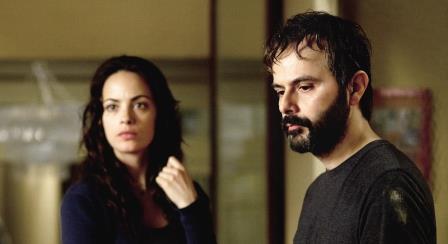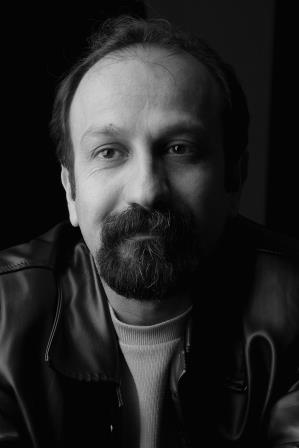There is always one film that reminds me why make all the effort to go to Cannes: this year (so far) it is the Iranian film The Past by Asghar Farhadi, the director who made the acclaimed A Separation a couple years back. The story of an Iranian man who returns to France to settle a divorce with his estranged wife and finds himself entwined in an intensely unhappy family cobweb, it begins with the former couple's stressed encounter at the airport, and then the stress just keeps building.
At first, it seems like an average psychological drama: the woman (Berenice Bejo) screams at two adorable kids, one hers, venting her tension about hiding the secret of her new-lover from her ex, with whom she might or might not still be in love. One little boy, who turns out to be the son of her new lover, rages in his own tantrums, tormented by some secret inner trauma, which we only discover midway through the film. Fouad kicks the door of the bedroom where his substitute mother eventually locks him, until her ex acts like a wonderful father and calms him down. Then the new lover shows up, and the two men spar as to whom will fix the clogged plumbing under the sink. In the midst of this tension the older daughter Lucie suddenly disappears, driven by what seems to be adolescent anger.
Sounds complicated? Or just like a normal family.

"I wanted the family at the heart of my film, as in A Separation, because nothing is more universal than the family, and this is a way to create closeness with the spectator," the director told us at the press conference following the premiere. "The family is the most ancestral relation we have, while the relationship in a couple, within that family, always has new twists, and this interests me as well."
This common family drama turns quickly into one of the most fascinating films screened yet at Cannes. Farhadi is a supreme storyteller, who began writing as a child, he told us, inspired by listening to people in his family tell stories. "My elder brother would tell a simple story and you would get disconnected from the world listening. The same with my grandfather."
In The Past, we are riveted to the story, as if in the hands of a griot.
We also notice that the sets, which seem banal, have an eerie "chosen" quality to them. The house is a ramshackle mess, under construction, just like the family itself. "I chose this old house near the railway station," the director explained. "Because it shows the passing of time and this is the theme of the story."
The past in this story is the love story that once existed between this man and his ex-wife, as well as the one that existed between the new lover and his wife. This past is the subtext of the entire film, filled with secrets.
"The past," the director continued. "Can never be eliminated. The past weighs on us. It no longer exists, but it is subjectively present through our memories with a certain nostalgia." He added a refreshing antidote to the new-age commonplace forget the past. For Farhadi: "One tries to get rid of the past, go ahead, but no human being can do that. To go towards the future means to escape."
The past never leaves this family as in each scene, a new secret arises. Why is the new lover's ex in a coma? This becomes a driving plot question, creating a suspense equal to Hitchcock's. Why does the daughter Lucie seem to hate her mother and her new lover? And why does the patient fatherly ex husband, who consoles and pacifies each character, including the new lover, stay in the midst of this drama?
Is the fact that his baggage was damaged in his travels a symbol?
The power of this film lies in the complicated psychologies of each character, understood through their anguished faces and gestures: the little boy who grabs onto the subway pole, refusing to go to the hospital to visit his "dead" mother; the girl Lucie who stands distressed alone at the train station; the mother Marie who is constantly telling everyone to either "hurry up" or "go upstairs" or "leave", and frantically puffs at cigarettes in-between. Each lingering shot on a character reveals that he or she is in the midst of making a difficult inner decision, and unable to express all that is going on inside.
It is very human.
And complex. The story keeps shifting, as do the relationships.
"The relationship between a couple is the most complex there is, with hatred and love, with a fluidity of meaning that changes all the time," the director stated. "The truth is constantly fluctuating, and our knowledge is partial."
But the quality that I personally most appreciated in this film is that the director knows what he is doing. His is not chaotic melodrama, but a carefully crafted orchestra in which each character is important and each scene advances a new angle. Back in Paris, where I teach theater, I have difficulty explaining to students that even the most minor character matters and must have a "backstory" or "desire". In this movie, even the immigrant assistant who works at the dry-cleaners becomes fundamental for the story, as she reveals secrets of her own, related to a question of who "stained" a dress.
"Similar to Ibsen," one fellow journalist noted, at the press conference.
The director nodded. He admitted his own extensive background in theater informs his cinematic craft. He spent seven years studying theater and directing plays, and was then invited to work on radio, which led to directing television series, and then film. "My theater period was the most informative period of my life. I became familiar with the greats, with Chekhov, Ibsen, Williams, Ionesco, Pinter."
"I love all the actors in my film," he added. "Every character has his or her own place."

Farhadi is also very clear in his philosophical ideas---and that ultimately, for him, this film is a meditation of our relationship to time.
"Only children live in the present. For us, we are always in relationship to the past and the future, and have an ambiguous relationship with both. The past is not more clear than the future, as it is re-written as we question it. And the minute you go back into the past, you are also going into the future."
The brilliant ending shot---a tender close-up--reveals this complicity of past and future, as well as another concern of the director's: the responsibility one has for making an ethical choice at every moment.
"I think that we are responsible and connected to everything that happens in the world. Everything we do has an influence."
